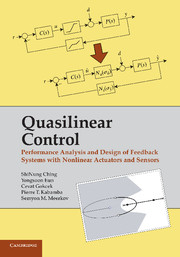 Quasilinear Control
Quasilinear Control Published online by Cambridge University Press: 01 June 2011
Motivation: The nonlinearities in sensors and actuators lead to performance degradation in LPNI systems as compared with linear ones. In this situation, two questions arise: (1) How can nonlinear instrumentation be selected so that the degradation is no more than a given bound? (2) Is it possible to modify the controller so that for a given nonlinear instrumentation, the linear performance is recovered? These questions motivate the subject matter of this chapter. Specifically, the first question leads to a method of partial performance recovery and the second to a complete performance recovery technique.
Overview: We develop techniques for both partial and complete performance recovery. Specifically, we show that the solution of the former is given by a Nyquist stability criterion-type technique (Section 7.1), while the latter is provided by the so-called controller boosting approach (Section 7.2).
Partial Performance Recovery
Scenario
In practice, control systems are often designed using linear techniques. In reality, control systems often (or, perhaps, always) include saturating actuators. The question arises: How large should the level of saturation be so that the performance predicted by linear design does not degrade too much? In this section, this question is addressed in the framework of the disturbance rejection problem.
To save this book to your Kindle, first ensure [email protected] is added to your Approved Personal Document E-mail List under your Personal Document Settings on the Manage Your Content and Devices page of your Amazon account. Then enter the ‘name’ part of your Kindle email address below. Find out more about saving to your Kindle.
Note you can select to save to either the @free.kindle.com or @kindle.com variations. ‘@free.kindle.com’ emails are free but can only be saved to your device when it is connected to wi-fi. ‘@kindle.com’ emails can be delivered even when you are not connected to wi-fi, but note that service fees apply.
Find out more about the Kindle Personal Document Service.
To save content items to your account, please confirm that you agree to abide by our usage policies. If this is the first time you use this feature, you will be asked to authorise Cambridge Core to connect with your account. Find out more about saving content to Dropbox.
To save content items to your account, please confirm that you agree to abide by our usage policies. If this is the first time you use this feature, you will be asked to authorise Cambridge Core to connect with your account. Find out more about saving content to Google Drive.